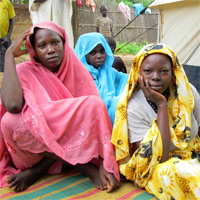
Introduction
As South Sudan edges toward independence in July 2011, Abyei remains a critical flashpoint for conflict, as demonstrated by the recent intentional burning of villages by forces reportedly aligned with the northern government, and the displacement of 20,000 residents. Considered perhaps the most difficult issue in talks between North and South, the current security situation is reflective of age-old problems that continue to plague Abyei: a culture of impunity among security forces, abuse and neglect of civilian populations, culminating in the violence at Maker Abior, Tajalei, and Noong, among other places. Contested by the Ngok Dinka, aligned with the Sudan People’s Liberation Movement, or SPLM, and nomadic Misseriya groups that have historically aligned with the North, Abyei has been a point of conflict over land, oil, and identity. The Comprehensive Peace Agreement’s Abyei Protocol has never been implemented effectively, with successive international mediation efforts rejected by Sudan’s ruling National Congress Party.[i]
The high national stakes involved, and the catalytic role that a political deal on Abyei could play in unraveling post-referendum negotiations, threaten to reduce Abyei to nothing more than a “great game.” Cognizant of this, communities on the ground are apprehensive about the future. These anxieties have transformed Abyei into a stage for violent posturing and maneuvering by civilians that fear their grievances are not being heard.
At this critical juncture, it would be dangerous for the international community, as well as the NCP and SPLM, to remain content with a series of stopgap security measures to address the deteriorating situation on the ground rather than a political solution to Abyei. These measures have sought to address escalating tensions on the ground by introducing into an already combustible environment new security forces, to negligible, or even harmful, effect. As security concerns take predominance over the political agenda, it is only a matter of time before tactics give way to full-scale war.
[i] For Enough’s previous analysis on Abyei, see the following reports and pieces: Abyei: Sudan’s Next Test by Colin Thomas-Jensen and Maggie Fick https://enoughproject.org/files/publications/Abyei_Paper.pdf ; Abyei: Sudan’s Kashmir by Roger Winter and John Prendergast https://enoughproject.org/publications/abyei-sudan%E2%80%99s-%E2%80%9Ckashmir%E2%80%9D ; U.S. Leadership on Abyei: A Crucial Ingredient for Peace in Sudan https://enoughproject.org/blogs/us-leadership-abyei-crucial-ingredient-peace-sudan#comments ; Abyei: Sudan’s Flashpoint In the Making? By Matt Brown https://enoughproject.org/blogs/abyei-sudans-flashpoint-making .

